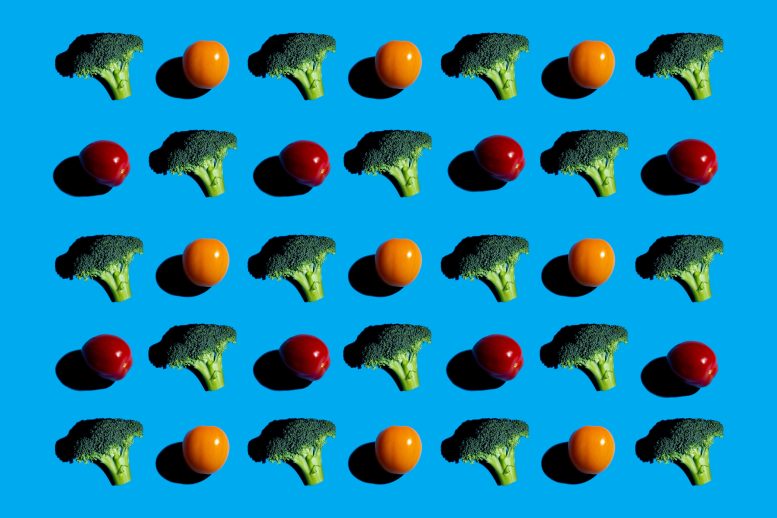
Researchers estimate 7 out of 10 cases of type 2 diabetes worldwide in 2018 linked to food choices. Credit: Alonso Nichols/Tufts University
A study has established a correlation between a poor diet and 14 million cases of type 2 diabetes worldwide.
According to a research model developed by the Friedman School of Nutrition Science and Policy at Tufts University, poor diet was a significant factor in the development of over 14.1 million cases of type 2 diabetes in 184 countries in 2018. This accounts for over 70% of all new diagnoses worldwide.
The study, published on April 17 in Nature Medicine, offers valuable insights into the dietary factors responsible for the burden of type 2 diabetes by region, based on an analysis of data from 1990 to 2018.
Of the 11 dietary factors considered, three had an outsized contribution to the rising global incidence of type 2 diabetes: Insufficient intake of whole grains, excesses of refined rice and wheat, and the overconsumption of processed meat. Factors such as drinking too much fruit juice and not eating enough non-starchy vegetables, nuts, or seeds, had less of an impact on new cases of the disease.
“Our study suggests poor carbohydrate quality is a leading driver of diet-attributable type 2 diabetes globally, and with important variation by nation and over time,” says senior author Dariush Mozaffarian, Jean Mayer Professor of Nutrition and dean for policy at the Friedman School. “These new findings reveal critical areas for national and global focus to improve nutrition and reduce devastating burdens of diabetes.”
Type 2 diabetes is characterized by the resistance of the body’s cells to insulin. Of the 184 countries included in the Nature Medicine study, all saw an increase in type 2 diabetes cases between 1990 and 2018, representing a growing burden on individuals, families, and healthcare systems.
The research team based their model on information from the Global Dietary Database, along with population demographics from multiple sources, global type 2 diabetes incidence estimates, and data on how food choices impact people living with obesity and type 2 diabetes from multiple published papers.
The analysis revealed that poor diet is causing a larger proportion of total type 2 diabetes incidence in men versus women, in younger versus older adults, and in urban versus rural residents at the global level.
Regionally, Central and Eastern Europe and Central Asia —particularly in Poland and Russia, where diets tend to be rich in red meat, processed meat, and potatoes —had the greatest number of type 2 diabetes cases linked to diet. Incidence was also high in Latin America and the Caribbean, especially in Colombia and Mexico, which was credited to high consumption of sugary drinks, processed meat, and low intake of whole grains.
Regions, where diet had less of an impact on type 2 diabetes cases, included South Asia and Sub-Saharan Africa —though the largest increases in type 2 diabetes due to poor diet between 1990 and 2018 were observed in Sub-Saharan Africa. Of the 30 most populated countries studied, India, Nigeria, and Ethiopia had the fewest case of type 2 diabetes related to unhealthy eating.
“Left unchecked and with incidence only projected to rise, type 2 diabetes will continue to impact population health, economic productivity, health care system capacity, and drive health inequities worldwide,” says first author Meghan O’Hearn. She conducted this research while a Ph.D. candidate at the Friedman School and currently works as Impact Director for Food Systems for the Future, a non-profit institute and for-profit fund that enables innovative food and agriculture enterprises to measurably improve nutrition outcomes for underserved and low-income communities. “These findings can help inform nutritional priorities for clinicians, policymakers, and private sector actors as they encourage healthier dietary choices that address this global epidemic.”
Other recent studies have estimated that 40% of type 2 diabetes cases globally are attributed to suboptimal diet, lower than the 70% reported in the Nature Medicine paper. The research team attributes this to the new information in their analysis, such as the first-ever inclusion of refined grains, which was one of the top contributors to diabetes burdens; and updated data on dietary habits based on national individual-level dietary surveys, rather than agricultural estimates. The investigators also note that they presented the uncertainty of these new estimates, which can continue to be refined as new data emerges.
Reference: “Incident type 2 diabetes attributable to suboptimal diet in 184 countries” by Meghan O’Hearn, Laura Lara-Castor, Frederick Cudhea, Victoria Miller, Julia Reedy, Peilin Shi, Jianyi Zhang, John B. Wong, Christina D. Economos, Renata Micha, Dariush Mozaffarian and Global Dietary Database, 17 April 2023, Nature Medicine.
DOI: 10.1038/s41591-023-02278-8
The study was funded by the Bill and Melinda Gates Foundation.
Health - Latest - Google News
May 06, 2023 at 09:25PM
https://ift.tt/aOjYLNn
New Study: 70% of Type 2 Diabetes Cases Linked to Food Choices - SciTechDaily
Health - Latest - Google News
https://ift.tt/VrYPZ9d
Bagikan Berita Ini














0 Response to "New Study: 70% of Type 2 Diabetes Cases Linked to Food Choices - SciTechDaily"
Post a Comment